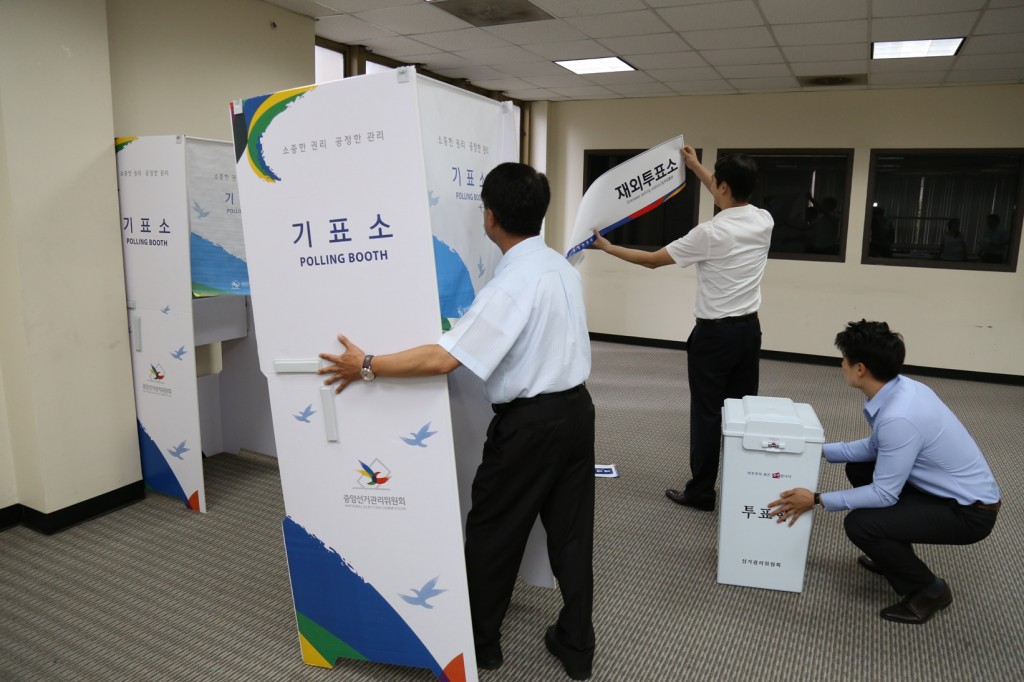- California Assembly OKs highest minimum wage in nation
- S. Korea unveils first graphic cigarette warnings
- US joins with South Korea, Japan in bid to deter North Korea
- LPGA golfer Chun In-gee finally back in action
- S. Korea won’t be top seed in final World Cup qualification round
- US men’s soccer misses 2nd straight Olympics
- US back on track in qualifying with 4-0 win over Guatemala
- High-intensity workout injuries spawn cottage industry
- CDC expands range of Zika mosquitoes into parts of Northeast
- Who knew? ‘The Walking Dead’ is helping families connect
S. Korea expects big rise in overseas voter turnout, politicians prepare global campaign

Voters still have to travel to one of nine Consulate offices spread out across the U.S., but they will only have to do it once this time around. (Korea Times)
By Brian Han
South Korea’s Presidential and National Assembly candidates face a growing need to campaign outside of their native country — primarily in the U.S. and China — in order to maximize success in upcoming elections.
A recent change in the voting system is making international strategies more relevant than ever.
For the first time in South Korea’s political history, overseas citizens can register to vote online, which will lower the barrier to participate in elections.
The change is expected to fuel a significant rise in voter turnout in this particular demographic, which is made up of approximately 2.3 million people.
With South Korea’s elections for 246 seats in the National Assembly coming up in 2016, political candidates are implementing new campaign strategies to take full advantage.
The general idea is to make a stop at each of the major Korean communities including Los Angeles, New York City, Atlanta and San Francisco among many others.
The most dense South Korean populations outside of the country reside in the U.S. and China, so most of the overseas efforts will be directed toward those areas.
Campaigning outside of South Korea is not a new phenomenon, but with a steadily growing overseas voter base it is becoming a more important factor as each election season passes.
Much of this demographic is made of international students, employees with work permits or those working for Korean companies with locations in other countries.
The previous system in the U.S. required voters to register within a 90-day window at the South Korean Consulate that covered the jurisdiction of that voter’s residence.
They would then have to come back during a separate five-day period to actually cast their votes.
For example, a Korean citizen living in New Mexico previously had to travel to Los Angeles, Calif. to register at the Consulate, which covers Arizona, Nevada, Southern California and — you guessed it — New Mexico. Then that same person would have to make travel arrangements at a later date to actually cast their vote.
The process was not only expensive, but took too much time for some voters. This may explain the five percent turnout for this demographic during the most recent legislative election in 2012.
Voters still have to travel to one of nine Consulate offices spread out across the U.S., but they will only have to do it once this time around.
South Korea has two major political parties, the Saenuri party, also known as the conservative party, and the New Politics for Alliance (NPAD) party, also known as the democratic party.
Some members of the Saenuri party launched their overseas campaigns in April, but many politicians are planning to make their way to the U.S. in late July.
The list includes Saenuri incumbents Kim Moo-sung of the Yeongdo district and Shim Yoon-joe of the Gangnam district, as well as NPAD incumbent Kim Sung-gon of the first Yeosu district.
“The upcoming election will see a more accurate representation of the electoral system,” Senator Kim Sung-gon said. “This is made especially possible with the ability for overseas voters to register online. The overseas votes of nearly 2.3 million South Korean citizens can’t be ignored.”
President Park Geun-hye will also be traveling to the U.S. soon to visit the White House, but has experienced delays due to domestic problems including the most recent Middle East Respiratory Syndrome (MERS) outbreak.
Park is a member of the Saenuri party and it is a distinct possibility that she will travel with other party members during the U.S. campaign trail considering the 2017 presidential election is not far off.
















